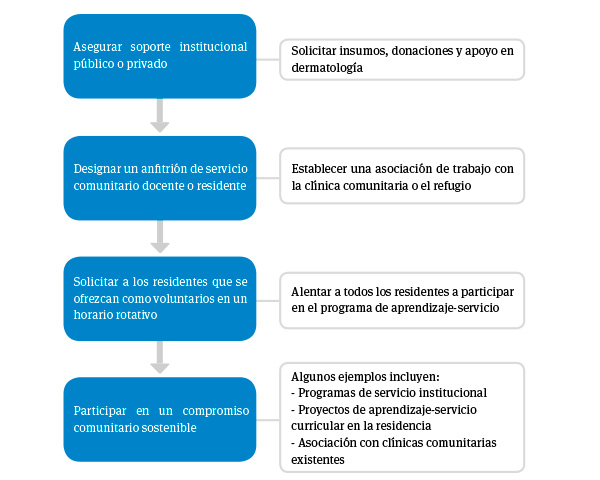Significant experience: community social dermatology as a training approach
DOI:
https://doi.org/10.29176/2590843X.1681Keywords:
Community health networks, Dermatology, Preventive health services, Public health, EducationAbstract
This article addresses the concept of community social dermatology based on the significant experience of training in the dermatology specialization program of the Universidad Libre de Cali and its relationship with other experiences of social dermatology in Latin America. Likewise, highlight the importance of open training scenarios for working with populations. In this sense, a review of scientific production on social
dermatology in the context of Latin America was conducted and contrasted with the missionary proposal of the Universidad Libre de Cali. Finally, reflections and conclusions are presented aimed at recognizing the relevance of social dermatology and the important challenges that exist in the national context for its dissemination, application, and recognition.
References
Casas I. Dermatología comunitaria: una atractiva manera de ejercer, aprender y enseñar dermatología. Rev Argent Dermatol. 2011;5:353.
Campos Macías P. La dermatología en el primer nivel de atención médica y sus implicaciones sociales, ¿un reto no tomado? Estudio de investigación educativa. Dermatol Rev Mex. 1997;41(3):109-12.
Humphrey VS, James AJ. The Importance of Service Learning in Dermatology Residency: An Actionable Approach to Improve Resident Education and Skin Health Equity. Cutis. 2021;107(3):120-2. https://doi.org/10.12788/cutis.0199
Velásquez MM. Solidaridad y compromiso social en dermatología. Rev Asoc Colomb Dermatol. 2019;27(3):166-7. https://doi.org/10.29176/2590843X.1149
Velásquez MM. Compromiso con el profesionalismo en Dermatología. Rev Asoc Colomb Dermatol. 2019;23(4):242. http://doi.org/10.29176/issn.2590-843X
Espinosa Brito A. La formación social del médico. Rev Cubana Salud Pública. 2005;31(4):327-31.
Morales-Ruiz JC. Formación integral y profesionalismo médico: una propuesta de trabajo en el aula. Educ Med. 2009;2(2):73-82.
Mazzei ME. Dermatología comunitaria en Uruguay y en el mundo. Rev Med Urug. 2021;37(2):e37214. https://doi.org/10.29193/RMU.37.2.13
Estrada R, Chávez M de G, Estrada Chávez G, Estrada-Chávez R. Dermatología comunitaria en tiempos de pandemia. Efemérides de un programa. Dermatolo Rev Mex. 2021;65(3):311-8.
Casas M. Fundación Dermatología Comunitaria Argentina. CME. 2013;31(7):261.
Perin D, Rivelli V, Guglielmone MC, Aldama A. Detección extramuros de enfermedades de la piel. Rev Nac (Itauguá). 2011;3(1):48-51.
Humphrey VS, Lee JJ, James AJ. 14035 The role of community service in ACGME-accredited dermatology residency training programs. J Am Acad Dermatol. 2020;83(6):AB128. http://dx.doi.org/10.1016/j.jaad.2020.06.602
Patel B, Humphrey V, James A. 28470 Dermatology residents’ perspectives on the role of community service and service-learning in dermatology residency training programs: A nationwide survey. J Am Acad Dermatol. 2021;85(3):AB45. http://dx.doi.org/10.1016/j.jaad.2021.06.205
Williams J, Amerson EH, Chang AY. How dermatologists can address the structural and social determinants of health-from awareness to action. JAMA Dermatol. 2022;158(4):351-2. 10.1001/jamadermatol.2021.5925
Pérez Maza B. La equidad en los servicios de salud. Rev Cubana Salud Pública. 2007;33(3).
Vanegas-Carvajal EA, Moreno-López V, Echeverri-Rendón P. Ética de lo público: formar para la integridad humana y profesional en el contexto de la educación superior en Colombia. Revista CS. 2020;31(mayo):297-326. https://doi.org/10.18046/recs.i31.3251
Pererira T. Educar hoy en Colombia. Educación y Educadores. 2009;7:9-18.
Taberner R. e-Dermatología: redes sociales y otros recursos web. Actas Dermo-Sifiliográficas. 2016;107(2):98-106. https://doi.org/10.1016/j.ad.2015.09.005
St Claire KM, Rietcheck HR, Patel RR, Dellavalle RP. An assessment of social media usage by dermatology residency programs. Dermatol Online J. 2019;25(1):1-6. https://doi.org/10.5070/D3251042611
Laughter M, Zangara T, Maymone MC, Rundle C, Dunnick C, Hugh JM, et al. Social media use in dermatology. Dermatol Sin. 2020;38(1):28-34. https://doi.org/10.4103/ds.ds_43_19
How to Cite
Downloads

Downloads
Published
How to Cite
Issue
Section
License
Copyright (c) 2023 Revista de la Asociación Colombiana de Dermatología y Cirugía Dermatológica

This work is licensed under a Creative Commons Attribution-NonCommercial-ShareAlike 4.0 International License.

| Article metrics | |
|---|---|
| Abstract views | |
| Galley vies | |
| PDF Views | |
| HTML views | |
| Other views | |






